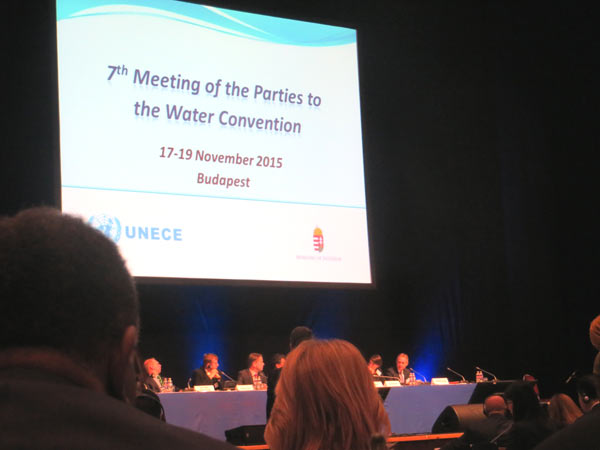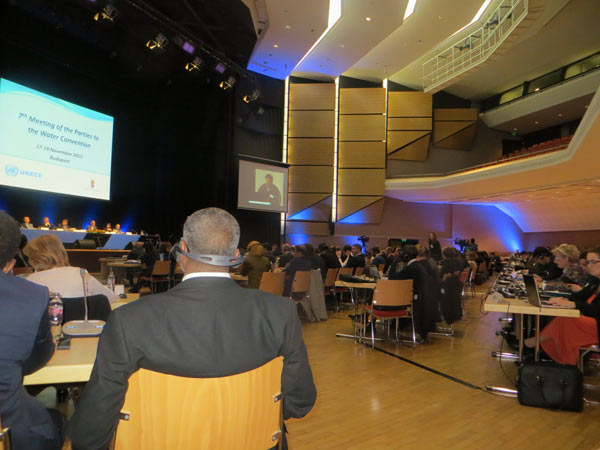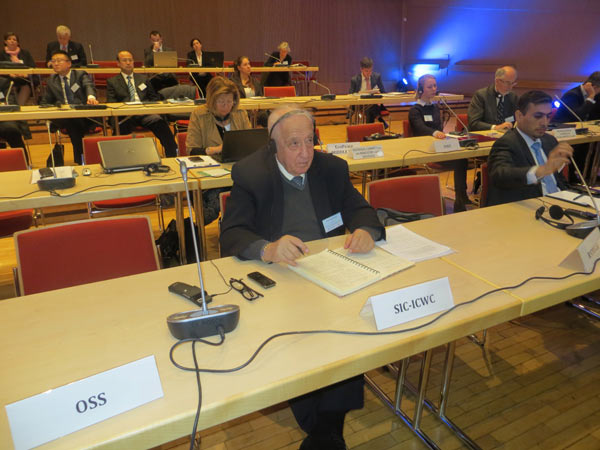SEVENTH SESSION OF THE MEETING OF THE PARTIES TO THE CONVENTION ON THE PROTECTION AND USE OF TRANSBOUNDARY WATERCOURSES AND INTERNATIONAL LAKES
17-19 November 2015, Budapest, Hungary
This session of the Meeting of the Parties marked the Convention's transition to a global level. The Meeting's high-level segment was opened on the 17th of November with the welcome from the President of the Republic of Hungary. His speech was read by Csaba Korosi, from the Office of the President. In this speech the President underlined that after 40 years since the adoption of the Convention and after 23 years since its entry into force the present situation has proven the urgency of its globalization, especially in view of more frequent droughts and floods taking place all over the world. The leaders of the countries should assume their responsibilities for water on a global level as for a shared and uniting resource.

In the video message by the United Nations Deputy Secretary-General he underlined that water scarcity may hamper development and, at the same time, be a driver. The Convention is in line with SDG 6 and could build a foundation for new water relations between and inside the countries, as well as inside national communities. He also noted that the world was not ready to realize consequences that water scarcity may bring. In addition to the current flow of migrants, the flow of “water-thirst migrants” could be formed.
The Minister of Interior of Hungary, Director General of the Italian Ministry for the Environment, Land and Sea, and United Nations Under-Secretary-General, Executive Secretary of the United Nations Economic Commission for Europe Mr. Christian Friis Bach spoke at the opening of the session.
The Secretariat reported on ratification of the Convention by 41 parties.
Mr. Bach underlined an importance of the Convention at present. He also noted that droughts occurring all over the world indicated to a need for transboundary water cooperation. And this was not by accident that new agreements between Mexico and the United States and Ethiopia, Egypt and Sudan were reached. Water diplomacy could help to apply the Convention to the benefit of the Agenda for Sustainable Development.
The general segment meeting summarized the three-year work of the Commission on a variety of topics, particularly on quantifying the benefits of transboundary cooperation, adapting to climate change, work of the Implementation Committee, assistance supporting accession to and implementation of the Convention through projects on the ground, and on implementation in general. Country representatives that took the floor presented their activities. In particular, the Director of the Russian Federal Water Agency Marina Silvestrova spoke about all-round application of basin method, assessment of quality in water sources, and development of early warning. The Lebanese representative Fadi Komair described the situation in the two rivers – Orontes and Jordan – in the complex Middle East region. For the Orontes River, a joint committee was established, river treatment campaign was organized, direct benefits from the developed joint database was gained, and an agreement was reached on application of the polluter pays principle. The road map was drawn up for the Jordan River and the countries adopted the Red Sea – Dead Sea Project, which would be a driver for uniting of efforts between the Middle East states. The Permanent Secretary from the Ministry of the Environment Hannele Pokka stressed the role of her country as one of initiators of the Convention and that Finland was focused now on financial support and enhancement of activities for adaptation to climate change.

The Iraqi Minister of Water Resources Mohsin Asfoor Lafta AL-KURD placed greater focus on potential acceding of Iraq to the Convention provided that a joint action plan with Turkey and Syria would be followed. He paid particular attention to complexities in water management due to intensified terroristic activity and that it would be inadmissible to use hydraulic structures as a weapon in military actions.
Kazakh Vice-Minister of Agriculture Yerlan Nishanbayev presented huge work that the country made on transboundary cooperation with China, Russia, and Aral Sea basin countries. Kazakhstan was developing a new economic direction – green growth. Showing as an example joint activities under umbrella of the International Fund for Saving the Aral Sea, he proposed to hold a summit of the Heads of Central Asia State so that to discuss changes in the situation since the last joint meeting of the Heads in 2009. Kazakhstan put forward a number of new initiatives by establishing the joint investment fund and the water security center. And Kazakhstan suggested holding the next Eighth session of the meeting of the parties in Almaty.
Short speeches were also delivered by representatives of Azerbaijan, Bosnia and Herzegovina, Romania, Macedonia and by a number of countries outside Europe that expressed their wishes to accede the Convention: Bangladesh, Ephiopia, Chad, etc.
Special session was devoted to global opening of the Convention. It was stressed in the conclusion that implementation of the Water Convention at a global level would require strong political will, appropriate capacities, and financial and partnership relations between concrete actors.
Review of the past activities was started from discussion of the Policy Guidance Note on Benefits of Transboundary Water Cooperation prepared by Estonia. The effectiveness of such approaches was demonstrated at a side event in the report of Mr. Roberto Martin-Hurtado, who showed through case-studies a possibility of gaining effects through coordinated actions in development, where countries agree on joint contributions, in reduction of losses and in mitigation of consequences. Relevant GWP report was devoted to quantification by Russia, Lithuania, and Belarus of the benefits of cooperation along the Neman River.

Prof. V.A.Dukhovniy showed as an example of additional benefits the IWRM-Fergana Project, which achieved success in improvement of water and land productivity and in water saving through common understanding, common methodological approach to implementation of IWRM, information openness, knowledge generation, and closer cooperation and mutual understanding with donors.
Similarly high benefits were achieved in cooperation along Rhine and Maas as the representative from the Netherlands reported. Thanks to the efforts of the Joint Rhine Commission, they managed to restore good river water quality up to Bern, with consequent restoration of salmon fishes there.
The countries and river basin organizations were offered to find their interest in the use of the Policy Guidance Note for quantification of benefits in the future and join this working group. SIC ICWC suggests that after detailed study of this document it would apply to the Secretariat for joining the group.
At the end of the first session day, the topic of adaptation to climate change in transboundary basins was addressed. The acting Ukrainian Minister of Environment Mr. Segey Kurkin presented activities undertaken in Ukraine for overcoming of freshwater scarcity in 11 main transboundary river basins.
Mr. Marco Toscano-Rivalta from the UN Office for Disaster Risk Reduction underlined the importance for the global society to be prepared to expected climate changes and mitigation measures. The French Ambassador for the Environment Xavier Sticker described French experience in this regard.
The Meeting decided to incorporate the topic of adaptation to climate change in the future program 2016–2018 and invited the countries and basin organizations to express their interest to join the program through pilot projects. Taking into account that Uzbekistan will take part in the World Bank’s Climate Adaptation and Mitigation Program for Aral Sea Basin, it would be not unreasonable to join the topic on behalf of the Uzbek Ministry of Agriculture and Water.
On 18 November 2015, the side-event for water-food-energy-ecosystems nexus was held. A publication was presented with the results of nexus assessment in the basins of Alazani (Caucasus), Sava (Central Europe), and Syr Darya (Central Asia).
During discussion Director of SIC ICWC Prof. V.Dukhovniy criticized the methodological approach and the use of the term ‘nexus’, which many users, especially in hydropower, understand as “priority water use” while focusing on the meaning of this term as “the core”. Meanwhile it was underlined that for the Syr Darya River water is the core itself, and, moreover, citing this river as an example, it was shown that given methodology produced nothing for searching of consensus and paving the way for future development. It is necessary to revise fundamentally methodological guidance, while aiming at modeling and analytical approaches to search best solutions and develop appropriate measures that would help to narrow the distance between the parties.
The Uzbek representative Mumin Turayev also gave his comments to the report, while stressing that the authors missed a complex pattern of water resources in the Syr Darya basin, which consisted of both transboundary and local elements. Moreover, the authors did not pay attention to the lack of multi-year regulation, which in turn serves as a key way to overcome flow fluctuations caused by climate change. Nevertheless, Uzbekistan is ready to take part in revision of the report in part of Syr Darya.
During the afternoon session the participants discussed the work of the Implementation Committee and approved the candidatures of four new Committee members, including representative of Uzbekistan, Deputy Director of SIC ICWC Dr. D.R.Ziganshina.
Mr. Bo Libert addressed in his report the issues related to capacity building of participating organizations and their involvement in implementation. He described efforts made to enhance cooperation in the basins of Drina, Chu-Talas, and Upper Amu Darya and develop national dialogues in the EECCA region. The Uzbek representative Mr. Turayev commented that the countries situated in Amu Darya midstream and downstream are extremely interested in information from Tajikistan and Afghanistan on flow parameters and water use in upper Amu Daya. Mr. Libert promised to organize such exchange of information.
The Parties also discussed the topic on exchange of experience of joint basin bodies and adopted principles of such exchange.
The Meeting of the Parties also considered the report of the working group on Integrated Water Resources Management regarding the mechanism of reporting under the Convention and the standard form for information submission. It was decided to test the above mechanism in several basins in 2016-2017 and afterwards, based on the results, decide on its further development.
Before the beginning of the general meeting, the side event “Activities in Central Asia to support the implementation of international water law” was held on the 19th of November. Prof. Dukhovniy, Mr. Turayev and Mr. Fazilov from Uzbekistan, and representatives of Kazakhstan took the floor at this meeting and underlined a need for UNECE support to improvement of ICWC activity and enhancement of the legal framework for water cooperation. Yekaterina Strikelyova from CAREC suggested to use for enhancement of cooperation the on-going large regional projects financed by USAID, EU, WB, particularly projects on climate change and on improvement of water use. The speakers also marked the importance of better coordination among the donors.
As the International Water Assessment Center completes its work in Bratislava, Kazakhstan suggested hosting the Center in Almaty. Kazakhstan also proposed to hold the next 8th session of the Meeting of the Parties in Astana. The both proposals were supported.
During discussion of the Work Program for 2016-2018 the representative of the Uzbek Ministry for Agriculture and Water Resources Mr. Alamjon Fazilov took the floor and described the efforts made by Uzbekistan in water conservation, IWRM, and capacity building of water management organizations through training, development of information chains and Smart Water system. These fields will be further developed at the country level and simultaneously accumulated experience can be shared with the neighbors.
Prof. V.A.Dukhovniy,
Director SIC ICWC
|